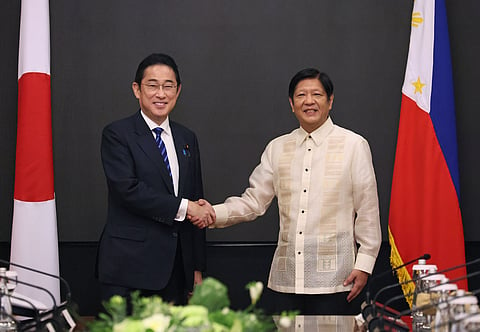The recent signing of the Reciprocal Access Agreement (RAA) between Japan and the Philippines marks a significant milestone in the relationship between the two countries.
Historically, the two nations were adversaries during World War II, but over the decades, they have transformed this relationship and elevated it from trading partners to military allies.
During the war, the Philippines suffered under Japanese occupation, and the memories of this period left a lasting impact on the Filipino psyche. However, in the post-war era, Japan embarked on a path of reconciliation and rebuilding, which included significant economic aid and investment in the Philippines.
In the 1950s and 1960s, Japan began providing reparations and development assistance to the Philippines, fostering economic ties that would lay the foundation for a strong trading partnership.
Over the decades, Japan emerged as one of the Philippines› top trading partners and investors. The economic interdependence between the two nations grew, with Japan investing heavily in infrastructure, manufacturing, and technology sectors in the Philippines.
The Reciprocal Access Agreement, signed 8 July this year, signifies a major shift in Japan-Philippines relations. The RAA allows for the mutual access of each country’s military forces to the other’s territories for joint training, exercises, and humanitarian missions. This agreement is Japan’s second of its kind, following a similar pact with Australia, and represents a significant step in Japan’s strategic pivot towards a more proactive defense posture in the Indo-Pacific region.
The RAA enhances the strategic partnership between Japan and the Philippines, reflecting their shared concerns over regional security threats, particularly those posed by China’s increasing assertiveness in the South China Sea. For the Philippines, which has longstanding territorial disputes with China, the agreement with Japan provides a valuable ally with advanced military capabilities and a commitment to maintaining regional stability.
Strategic Implications
The signing of the RAA must be understood within the broader context of shifting geopolitical dynamics in the Indo-Pacific. China’s rise as a regional power has led to increased tensions and competition, particularly in maritime domains. The South China Sea, a critical waterway for global trade, has become a flashpoint, with China asserting expansive territorial claims and building artificial islands with military installations.
For Japan, the RAA with the Philippines is part of a broader strategy to bolster its security alliances and partnerships in the region. Japan’s post-war constitution, particularly Article 9, limits its ability to maintain offensive military forces.
However, under Prime Minister Shinzo Abe and his successors, Japan has pursued a more assertive defense policy, seeking to reinterpret and amend constitutional constraints to allow for collective self-defense and greater military cooperation with allies.
The RAA also complements Japan’s existing security alliance with the United States, which remains the cornerstone of its defense strategy. By forging closer ties with other regional partners like the Philippines, Japan aims to create a network of like-minded nations committed to upholding the rules-based international order and countering coercive actions by revisionist powers.
Beyond the strategic and military aspects, the RAA also has significant economic and humanitarian dimensions. The agreement facilitates joint humanitarian assistance and disaster response (HADR) operations, which are crucial in a region prone to natural disasters such as typhoons, earthquakes, and tsunamis. Enhanced military cooperation will enable more effective and coordinated responses to such crises, benefiting both nations.
Moreover, the deepening of military ties is likely to have positive spillover effects on economic relations. Increased security cooperation can enhance investor confidence, as a stable and secure environment is conducive to economic growth and development. Japanese companies, already significant players in the Philippine economy, may find new opportunities for investment and collaboration in sectors such as defense, technology, and infrastructure.
The signing of the Reciprocal Access Agreement marks a historic turning point in Japan-Philippines relations. This development reflects the changing security landscape in the Indo-Pacific and the shared interests of both nations in promoting regional stability and countering common threats.
As former adversaries turned close partners, Japan and the Philippines demonstrate how historical animosities can be transformed into mutually beneficial alliances, contributing to a more secure and prosperous future for both nations and the wider region.


